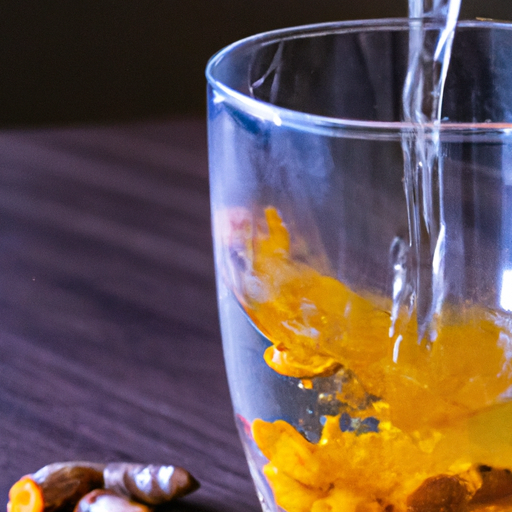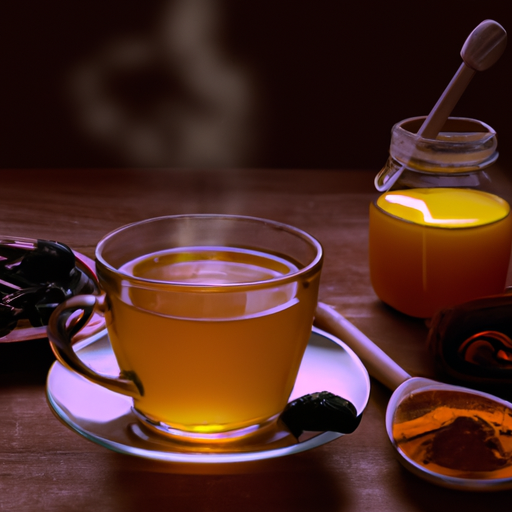Like a warm and soothing sunset on a summer evening, turmeric tea has the power to calm and heal. When it comes to combating inflammation, this golden elixir can be even more powerful when paired with the right ingredients. In this article, I will share with you the top additions to amplify the anti-inflammatory benefits of turmeric tea.
First and foremost, ginger adds a fiery kick to your tea, while also reducing inflammation and aiding digestion. The pungent and earthy flavor of black pepper enhances the absorption of curcumin, the active compound in turmeric responsible for its anti-inflammatory properties.
Cinnamon brings a touch of sweetness and helps regulate blood sugar levels, further reducing inflammation. To add a hint of natural sweetness, honey can be the perfect choice, as it also possesses anti-inflammatory properties.
For a refreshing twist, a squeeze of lemon not only adds a zesty flavor but also boosts the antioxidant power of turmeric. Coconut milk adds a creamy richness and provides healthy fats that enhance the absorption of turmeric’s benefits.
Lastly, turmeric paste, made from turmeric powder and water, can be added to create a more potent and concentrated form of turmeric in your tea.
With these powerful additions, your turmeric tea becomes a powerhouse of inflammation-fighting compounds. So sit back, relax, and let the healing properties of turmeric tea wash over you like a gentle wave, soothing your body from the inside out.
Key Takeaways
- Adding black pepper to turmeric tea enhances the absorption of curcumin, the active compound in turmeric, and enhances its anti-inflammatory effects.
- Ginger, which contains gingerol, has potent anti-inflammatory and antioxidant properties, making it a beneficial addition to turmeric tea for inflammation.
- Cinnamon helps regulate blood sugar levels and reduces inflammation, adding a warm and spicy flavor to turmeric tea.
- Lemon juice boosts the antioxidant power of turmeric, enhances the bioavailability of curcumin, and its citric acid acts as an antioxidant and reduces inflammation when added to turmeric tea.
Ginger
Ginger is a fantastic addition to turmeric tea for its anti-inflammatory properties. Not only does it complement the flavor of turmeric, but it also brings its own set of health benefits to the table. Ginger has been used for centuries in traditional medicine to alleviate various health conditions, including inflammation. It contains bioactive compounds, such as gingerol, that have been shown to have potent anti-inflammatory effects.
One way to incorporate ginger into your turmeric tea is by making ginger tea first. You can easily make ginger tea by steeping thinly sliced ginger in hot water for about 10 minutes. This will infuse the water with the natural compounds present in ginger, making it even more beneficial for reducing inflammation.
By adding this ginger tea to your turmeric tea, you create a powerful combination that can help combat inflammation in the body. The ginger and turmeric work synergistically to enhance each other’s anti-inflammatory properties, providing you with a natural and effective way to reduce inflammation.
Now, let’s move on to another important ingredient that can further enhance the benefits of turmeric tea: black pepper.
Black Pepper
To enhance the medicinal benefits of your turmeric tea, simply sprinkle a pinch of black pepper into your cup. This simple addition can significantly boost the absorption of the key compounds present in turmeric, such as curcumin, which is known for its powerful anti-inflammatory properties.
Studies have shown that black pepper contains a compound called piperine, which enhances the bioavailability of curcumin in the body. By adding black pepper to your turmeric tea, you can ensure that your body is able to absorb and utilize the full potential of this beneficial spice.
Furthermore, black pepper can also help counter any potential objection related to the taste of turmeric tea. Some people may find turmeric to have a slightly bitter or earthy taste, but the pungency of black pepper subtly masks this flavor. This means that you can enjoy the numerous health benefits of turmeric tea without being put off by its taste.
To make a delicious and nutritious cup of turmeric tea, simply combine a teaspoon of turmeric powder with a pinch of black pepper in a cup of hot water. You can also add a splash of lemon juice or a teaspoon of honey for added flavor.
Now, let’s move on to the next step and explore the benefits of adding cinnamon to your turmeric tea.
Cinnamon
Cinnamon is a versatile spice that adds a warm and spicy flavor to various dishes and beverages. In addition to its delicious taste, cinnamon also provides additional anti-inflammatory benefits.
Studies have shown that cinnamon contains compounds that can help reduce inflammation in the body, making it a valuable addition to turmeric tea for those seeking relief from inflammation.
Add a Warm and Spicy Flavor
For an extra kick of flavor, try adding a pinch of black pepper to your turmeric tea. It’ll give it a warm and spicy twist! Black pepper is one of the spicy ingredients that can enhance the flavor of turmeric tea. Not only does it add a pleasant heat, but it also has its own health benefits.
Black pepper contains a compound called piperine, which has been shown to improve the absorption of curcumin, the active compound in turmeric responsible for its anti-inflammatory properties. By adding black pepper to your turmeric tea, you can enhance the bioavailability of curcumin and potentially increase its effectiveness in reducing inflammation.
So, not only does black pepper provide a warm and spicy flavor, but it can also provide additional anti-inflammatory benefits.
Provide Additional Anti-Inflammatory Benefits
Spice up your turmeric brew with a dash of black pepper and let it work its magic on those achy joints. Adding black pepper to turmeric tea may seem like a simple flavor enhancer, but it actually serves a greater purpose. Black pepper contains a compound called piperine, which has been shown to increase the bioavailability of curcumin, the active compound in turmeric. This means that by adding black pepper to your turmeric tea, you can enhance its anti-inflammatory effects and maximize its potential benefits for reducing inflammation.
Incorporating herbal alternatives and natural remedies like black pepper into your daily routine can be a great way to support your body’s natural healing processes. Now, let’s move on to another natural addition to your turmeric tea: honey.
Honey
To enhance the anti-inflammatory properties of your turmeric tea, why not try adding a touch of honey? It not only adds a natural sweetness but also provides additional health benefits. Honey has been used for centuries as a natural remedy for various ailments due to its numerous therapeutic properties. When it comes to inflammation, honey has been found to have anti-inflammatory effects, which can help reduce pain and swelling. It contains antioxidants that combat free radicals in the body, reducing oxidative stress and inflammation.
Additionally, honey has antibacterial properties that can support the immune system and help fight off infections.
While honey is a great option to add to your turmeric tea, there are also alternatives if you prefer different flavors. Some people opt for maple syrup or agave nectar as natural sweeteners, which also have their own health benefits. Maple syrup contains minerals like manganese and zinc, while agave nectar has a low glycemic index, making it a good choice for those watching their blood sugar levels.
As we move on to the next section about lemon, another ingredient that can enhance the health benefits of turmeric tea, it’s important to consider the various options available to customize your tea and make it even more beneficial for your health.
Lemon
Brighten up your turmeric concoction by squeezing a splash of zesty lemon juice into your cup for an extra refreshing twist. Lemon not only adds a burst of flavor but also brings its own health benefits to the table.
Rich in vitamin C, lemons are known to boost the immune system and promote collagen production, which can aid in reducing inflammation. Additionally, the citric acid in lemons acts as an antioxidant, helping to neutralize free radicals in the body and protect against oxidative stress.
When combined with turmeric, lemon can enhance the anti-inflammatory properties of the tea. Turmeric contains a compound called curcumin, which has been extensively studied for its potential anti-inflammatory effects. Ginger benefits can also be incorporated into the tea for added inflammation-fighting power. Gingerol, the active compound in ginger, has been shown to possess anti-inflammatory and antioxidant properties.
To prepare your turmeric tea with lemon, simply squeeze the juice of half a lemon into your cup of turmeric tea. Stir well to combine the flavors and enjoy the refreshing and soothing beverage.
In the next section, we will explore the benefits of adding coconut milk to your turmeric tea for a creamy and nutritious twist.
Coconut Milk
Coconut milk is a fantastic addition to turmeric tea for inflammation due to its ability to create a creamy and rich texture. It not only adds a luscious mouthfeel but also offers a range of healthy fats that can support overall well-being. Additionally, coconut milk contains antimicrobial properties, which can help fight off harmful bacteria and promote a healthy gut.
Create a Creamy and Rich Texture
Adding a splash of milk or a dollop of honey can give your turmeric tea a creamy and indulgent texture that will make you savor every sip. If you prefer an alternative to coconut milk, there are several options available. You can try almond milk, cashew milk, or oat milk, which all provide a creamy consistency without the overpowering coconut flavor. These alternative dairy options can be easily found in most grocery stores and are suitable for those who are lactose intolerant or have milk allergies. To give you a better idea, here is a comparison table of the different milk alternatives:
| Milk Alternative | Creaminess | Flavor | Availability |
|---|---|---|---|
| Almond Milk | Medium | Nutty | Widely available |
| Cashew Milk | Rich | Creamy | Easily found |
| Oat Milk | Creamy | Neutral | Increasingly popular |
In addition to their creamy texture, these milk alternatives offer healthy fats and antimicrobial properties. They will add a delightful twist to your turmeric tea, making it even more enjoyable and beneficial for your health.
Offer Healthy Fats and Antimicrobial Properties
Indulge in the velvety richness of these milk alternatives, as they offer a creamy embrace and a powerful shield against harmful bacteria. Essential oils, known for their antimicrobial properties, can be a great addition to your turmeric tea. For instance, adding a few drops of tea tree oil or oregano oil can provide an extra layer of defense against pathogens.
Additionally, herbal remedies like ginger or cinnamon can not only enhance the flavor but also contribute to the anti-inflammatory properties of the tea. These ingredients contain compounds that’ve been shown to reduce inflammation and promote overall health.
To transition into the next section about turmeric paste, it’s important to note that while the milk alternatives discussed here offer great benefits, turmeric paste can take the health benefits to the next level.
Turmeric Paste
In this discussion, I want to talk about turmeric paste and how it can enhance both the turmeric content and flavor of your meals, while also increasing the anti-inflammatory benefits.
Turmeric paste is a concentrated form of turmeric that can be easily added to various dishes, such as curries or smoothies, to add a rich and earthy flavor. It doesn’t just enhance the taste, but it also boosts the anti-inflammatory properties of turmeric, making it an excellent addition to your diet for promoting overall health and well-being.
Enhance the Turmeric Content and Flavor
To really boost the turmeric content and add a delicious kick to your tea, try incorporating some freshly ground black pepper and a squeeze of lemon juice.
Black pepper contains a compound called piperine, which enhances the absorption of curcumin, the active ingredient in turmeric. This means that adding black pepper to your turmeric tea can help your body better utilize the anti-inflammatory properties of turmeric.
Additionally, the acidity of lemon juice can further enhance the bioavailability of curcumin.
The combination of turmeric, black pepper, and lemon juice can create a flavorful and potent beverage that’s not only beneficial for reducing inflammation but also refreshing to drink.
So, if you’re tired of the same turmeric latte or turmeric smoothie, give this turmeric tea recipe a try. It’s a simple way to increase the anti-inflammatory benefits of turmeric without any extra steps.
Increase the Anti-Inflammatory Benefits
To enhance the turmeric content and flavor of your tea, you can add various ingredients like ginger, cinnamon, honey, or lemon. These additions not only provide a delicious taste but also offer their own health benefits.
However, if you’re specifically looking to increase the anti-inflammatory benefits of turmeric tea, there are additional options to consider. One effective way is to increase the absorption of turmeric in your body. To achieve this, you can try consuming turmeric alongside black pepper, as it contains piperine, a compound that enhances the absorption of curcumin, the active ingredient in turmeric.
Another option is to incorporate turmeric supplements into your routine, which often come in a highly concentrated form and can provide a higher dose of curcumin.
By exploring these strategies, you can maximize the anti-inflammatory benefits of your turmeric tea.
- Add black pepper to turmeric tea
- Consider turmeric supplements
- Consume turmeric with healthy fats
- Try turmeric tea blends with other anti-inflammatory herbs
- Opt for fresh turmeric root when available
Frequently Asked Questions
How does adding ginger to turmeric tea help with inflammation?
Adding ginger to turmeric tea enhances the taste and also provides additional anti-inflammatory benefits. While ginger is not the only ingredient that can help with inflammation in turmeric tea, it is a popular choice due to its potent anti-inflammatory properties.
Is black pepper essential in turmeric tea for its anti-inflammatory benefits?
No, turmeric alone is not as effective in reducing inflammation compared to when it is combined with black pepper. Additionally, turmeric tea generally has no major side effects when consumed in moderation.
Can cinnamon be added to turmeric tea to enhance its flavor?
Cinnamon can be added to turmeric tea to enhance its flavor. It provides a warm and slightly sweet taste, making it a great alternative to black pepper. Additionally, cinnamon has its own health benefits, such as being rich in antioxidants and having anti-inflammatory properties.
What are the benefits of adding honey to turmeric tea for inflammation?
Adding honey to turmeric tea for inflammation has several benefits. Honey has anti-inflammatory properties and can help soothe inflammation. It also enhances the flavor of turmeric tea, making it more enjoyable to drink.
Is coconut milk a necessary ingredient in turmeric tea for its anti-inflammatory properties?
Coconut milk is not necessary for the anti-inflammatory properties of turmeric tea. There are coconut milk alternatives like almond or soy milk. Additionally, other spices like ginger or cinnamon can further enhance the tea’s anti-inflammatory benefits.
Conclusion
In conclusion, adding a combination of ginger, black pepper, cinnamon, honey, lemon, and coconut milk to your turmeric tea can provide a powerful boost in fighting inflammation.
This golden elixir, infused with the warmth of ginger and the zesty tang of lemon, creates a soothing and delightful experience for your taste buds.
With each sip, the healing properties of turmeric, enhanced by the black pepper’s absorption, work their magic, easing inflammation and promoting overall well-being.
So, why not indulge in this delicious and evidence-based remedy for a happier, healthier you?










